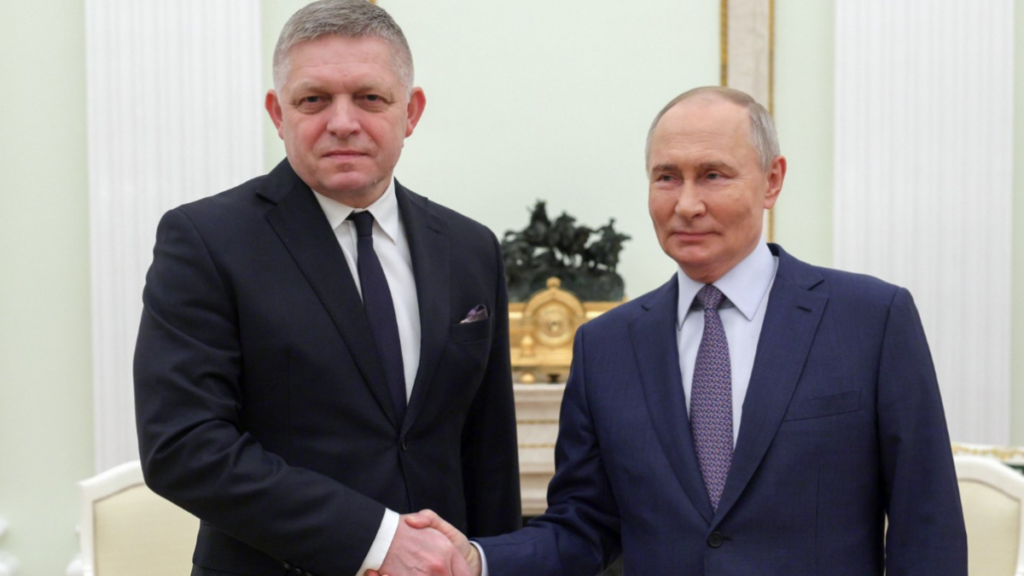In a notable diplomatic development, Slovakia’s Prime Minister Robert Fico visited Moscow to engage in talks with Russian President Vladimir Putin, making him one of the few Western leaders to do so since the onset of the Ukraine war three years ago. This visit reflects a significant shift in Slovakia’s political stance, particularly in terms of its energy policy and relations with Russia. Fico, who has been openly critical of the European Union’s support for Ukraine, emphasized discussions around the supply of Russian gas—a critical resource for Slovakia. The impending expiration of a gas transit agreement between Gazprom and Slovakia at the end of the year further underscores the urgency of these talks. By announcing that top EU officials were informed of his trip, Fico aimed to assure both domestic and international audiences of his governing approach during heightened geopolitical tensions.
The discussions with Putin encompassed a variety of topics, including military issues linked to the conflict in Ukraine and the prospect of establishing a peaceful resolution to the ongoing war. Fico’s comments suggest a desire to play a mediatory role, showcasing his aim to balance close ties with Russia while maintaining a rhetorical commitment to being a supportive neighbor to Ukraine. His diplomatic overtures come at a time when Ukrainian President Volodymyr Zelensky has expressed resistance to the continued transit of Russian gas through Ukraine, a position that complicates the energy security landscape for Slovakia and Hungary, both heavily reliant on Russian energy supplies. This visit may be seen as an attempt by Fico to mitigate the potential repercussions of these regional tensions on Slovakia’s energy needs.
Fico’s approach represents a distinct departure from previous Slovakian policy under his predecessors, particularly in terms of military support for Ukraine. Since resuming the role of Prime Minister in October 2023, Fico has terminated Slovakia’s military aid to Ukraine, emphasizing a strategy focused on negotiation rather than military support. This has drawn criticism from various quarters within the EU and among those who support robust actions against Russia in light of its aggression in Ukraine. Fico’s stance reflects a nuanced balance: while seeking to be seen as a conciliatory figure towards Ukraine, he simultaneously reaffirms Slovakia’s reliance on Russian gas as a foundational aspect of its energy security.
The geopolitical ramifications of Fico’s visit were significant, particularly in the context of ongoing security discussions among European leaders. On the same day as Fico’s Moscow meetings, leaders from Italy, Sweden, Greece, and Finland convened for a security summit where the collective assessment was that Russia continues to pose a “permanent and dangerous threat” to European stability. Finnish Prime Minister Petteri Orpo highlighted the need for increased defense spending and greater support for Ukraine. This juxtaposition illustrates the divergent paths European leaders are taking concerning Russia, with some advocating for a more assertive stance against Moscow’s actions while others, like Fico, appear more inclined towards accommodation or pragmatic engagement.
Fico’s priority seemingly lies in ensuring Slovakia’s energy stability, particularly given the looming uncertainties regarding gas supplies from Russia. His discussions in Moscow come at a crucial juncture in energy policy and reflect broader concerns within Central and Eastern European states that are heavily dependent on Russian energy resources. The impending expiration of gas transit agreements places additional pressure on Fico’s administration to secure favorable terms from Russia, which underlines the complexities of European energy politics amidst a backdrop of military conflict and diplomatic contention.
In conclusion, Fico’s Moscow visit exemplifies the balancing act Central and Eastern European nations must navigate in response to the broader geopolitical landscape shaped by the Ukraine conflict. His initiative for dialogue presents a direct challenge to the prevailing EU-oriented consensus on dealing with Russia. While he aims to foster good relations with both Ukraine and Russia, it remains to be seen how this strategy will play out in the context of Slovakia’s energy needs and its position within the EU framework, particularly as debates over defense and energy security continue to evolve in light of the ongoing war in Ukraine.

